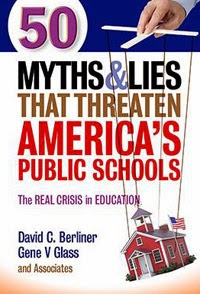I just ordered a book, and I can’t wait to get it.
Yesterday, I attended a panel presentation on Tempe’s ASU campus. The authors of 50 Myths and Lies that Threaten America’s Public Schools: The Real Crisis in Education presented compelling (and concise) responses to many of the ideas used to deny public funding for education, increase “accountability” measures and overall increase the fear and blame in the converstaions about public schools in the last two decades.
Next door at the Gammage center, news media flocked to cover the Clinton Global initiative University event.
 In the education lecture hall with Dr. David Berliner and Dr. Gene V. Glass and 12 or so of the doctoral students who wrote the book with them were perhaps 100 concerned teachers, administrators, parents and community organizers there for the EdXChange event. Several people commented that news media has largely given up on any sincere attempt to keep the public informed on ongoing issues in education. I have to agree. Privately funded think tanks and well-intentioned philanthropists get a lot of attention and have been allowed to frame the conversation surrounding public education. That needs to change.
In the education lecture hall with Dr. David Berliner and Dr. Gene V. Glass and 12 or so of the doctoral students who wrote the book with them were perhaps 100 concerned teachers, administrators, parents and community organizers there for the EdXChange event. Several people commented that news media has largely given up on any sincere attempt to keep the public informed on ongoing issues in education. I have to agree. Privately funded think tanks and well-intentioned philanthropists get a lot of attention and have been allowed to frame the conversation surrounding public education. That needs to change.
Most in the room seemed to concede that the effort to keep facts, research and common sense at the center of policy decisions in education would rest largely on the shoulders of teachers, researchers, and concerned citizens. We all share a responsibility to speak out, to share current information in the face of lies and easy “fixes,” and to organize ourselves in expanding circles of influence. One of the authors talked about the importance of counternarratives in education. I am hoping the day comes when educators can frame the narratives, and the dismantlers of public education must provide the counternarrative.
As a classroom teacher, I have a voice. I blog; I tweet; I participate as much as I can manage. I know that my personal strength is not in community organization. In fact, in day to day conversations on the topics, I have a hard time having the facts and research at my fingertips. But I want to be a part of changing the way people talk about education. That is why I must order this book. The authors have provided a rational and well-founded resource for those of us who want to take a stand, and need the facts in our back pockets and glove boxes.
Tell me, if I can afford another copy, to whom should I lend it?









Comments 6
Amethyst — I love your spirit and I agree with you that I hope someday more teacher can frame the narratives of education. I continue to talk with the teachers that I work with about teacher leadership. It is a difficult road — so much negativity. Right now I can’t take on another book (great summer reading though). I hope you will come back and blog about it after you read it.
The cool thing is that each chapter is short and readable, and the breadth of the myths and lies seems to cover a lot of ground. I’m thinking I may not read it cover-to-cover but will read parts and then pull it out as a useful resource.
I am so glad that you found the event to be meaningful, and I hope the book will be as well. I am always open to supporting teachers in any way that I can, especially in creating the counter-narratives we talked about on Saturday. That said, if you are looking to give this book to someone else, I would find your colleague who is **this close** to crossing the line from being a teacher in the technical sense to a teacher in the political, cultural, and moral sense. I am sure this would push him/her over the line, and lead to others crossing as well.
Amethyst, I was at Saturday’s session and agree with many of your sentiments. As a former classroom teacher, I too struggled to formulate daily conversations on policy that directly affected me as a teacher. I am encouraged to hear that you blog, tweet, etc. to continue the conversation!
What about sharing a copy of the book with a school board member from your local school district ? Invite him or her out to coffee and begin with a conversation. Share the book and a chapter or two that you find relevant from the perspective of a teacher.
Our school board members determine much of what is going on in our local school districts and need to be informed on the research and facts that are not “told” via the media. It was wonderful to see and hear Victor Diaz, a School Board member in his own community as an author. We need more individuals like him in all of our communities.
Good ideas! I am new to my community here in Tempe, and so perhaps this is an opportunity to get to know who is **this close** and open to these conversations. And how I can have these conversations without getting **this close** to being reprimanded and/or not being seen as a team player.
I know that within the context of our PLC work at school, there are not really times to deal with these myths and lies. We’ve settled on meaningful work within the context of current policy decisions that have already been made.
The Arizona K12 Center will be hosting Dr. Berliner in a our Thought-Leader Series here at our Professional Learning Center in Phoenix beginning this fall. This new AZK12 Calendar event will kick off with Dr. Berliner and his new book on September 16th! Be on the lookout for more information coming soon to our website at azk12.org.